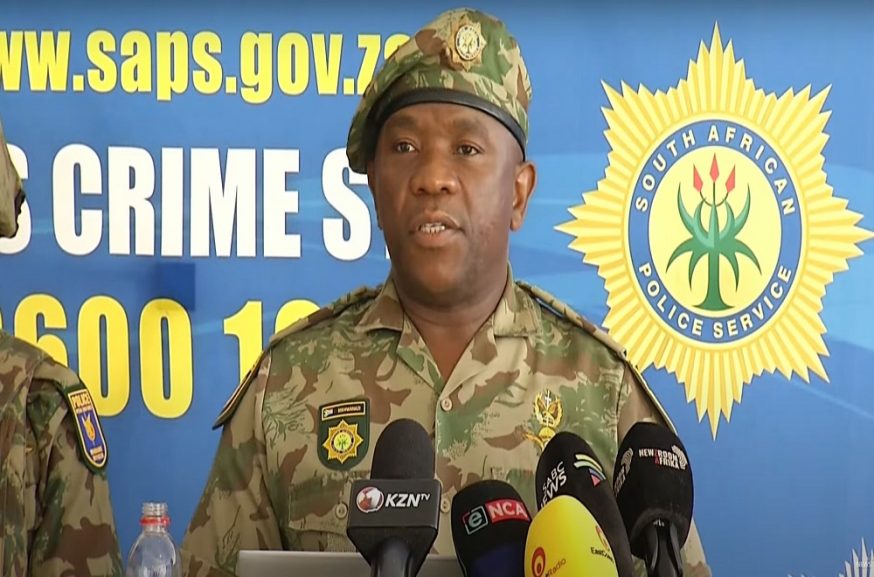By Desmond Nleya
On Sunday South Africa woke up to an extraordinary and unsettling spectacle: Lt. Gen. Nhlanhla Mkhwanazi, respected KwaZulu-Natal Provincial Commissioner, publicly accused senior police bosses, politicians, and even elements of the judiciary of entrenched corruption.
The press conference, called unannounced on a weekend morning, has ignited fierce debate—about both the message and the messenger. The allegations themselves were momentous. According to Mkhwanazi, a network of powerful figures in the security apparatus including the Police Minister is actively protecting criminal syndicates, obstructing investigations, and enriching themselves while ordinary South Africans are ravaged by crime.
Predictably, the ANC Youth League President was quick to dismiss the claims, arguing that “if the General is serious, he must open criminal cases instead of turning the country’s security into tabloid fodder.” The statement reflects a view held by some: that Mkhwanazi’s move was reckless and potentially damaging to public trust in state institutions. But to understand the gravity of this moment, one must examine several layers—timing, motive, and implications.
It is impossible to ignore that this press conference came on a Sunday, a day when the national leadership wasn’t fully aware of what was brewing. Some analysts believe this was a tactical choice. A Sunday media drop guarantees uninterrupted news coverage and ensures that neither political nor police spokespeople have time to coordinate a coherent response.
Others interpret the timing as evidence of desperation. It is no secret that South Africa’s crime statistics have remained stubbornly high, with communities living in fear while corruption scandals continue to surface. For a serving General to take this step suggests that, in his view, internal protocols had been exhausted.
If Mkhwanazi’s assertions are accurate, he was left with no viable route other than to appeal directly to the court of public opinion. This would be consistent with an officer driven to act by frustration and moral indignation at watching the powerful remain untouchable.
The Motive: A Last Resort or a Suicide Mission?
This is where the analysis becomes more complex. There are two competing narratives:
1. The Last Resort Theory
o Mkhwanazi, after years of fighting a losing battle against entrenched corruption, felt he had nothing left but the truth.
o He knew naming names could end his career—or worse.
o The press briefing, in this reading, was the act of a man with genuine conviction who had failed to secure internal accountability.
2. The Suicide Mission Theory
o Critics argue Mkhwanazi was fully aware of both SAPS protocols and the dangers of “going public.”
o They question whether this was a pre-emptive strike to protect himself, especially if he anticipated imminent arrest or public discrediting.
o This interpretation frames the event as a calculated gamble: either win public sympathy as an anti-corruption martyr or, at the very least, complicate any efforts to neutralise him quietly.
Either scenario implies he believed extraordinary action was necessary.
Implications for South Africa’s Security
Regardless of motive, this exposé has immediate and profound implications:
• Public Trust: South Africans already deeply distrustful of their institutions may now see them as irredeemably compromised.
• Operational Security: Active investigations could be jeopardised if details emerge prematurely, potentially allowing suspects to flee or destroy evidence.
• Morale in SAPS: Police leadership has been left scrambling to restore internal cohesion and reassure frontline officers that their sacrifices are not in vain.
Another dimension worth noting is that Mkhwanazi enjoys significant support among ordinary citizens, who see him as one of the few senior police leaders willing to challenge criminality at every level. This support may have emboldened him to take such a risk—betting that public opinion would offer him a degree of protection from immediate retribution.
In the end, Lt. Gen. Mkhwanazi’s exposé is either:
• A courageous last stand by an officer determined to clean house before being silenced;
or
• A desperate move by a man cornered by his own impending downfall, seeking to shape the narrative before it shapes him.
What is indisputable is that these revelations demand urgent, transparent investigation. South Africa cannot afford a policing crisis at a time when violent crime is rampant and trust in public institutions is fraying.
Whether hero or opportunist, Mkhwanazi has forced the country to look in the mirror—and that may be the most unsettling truth of all.


